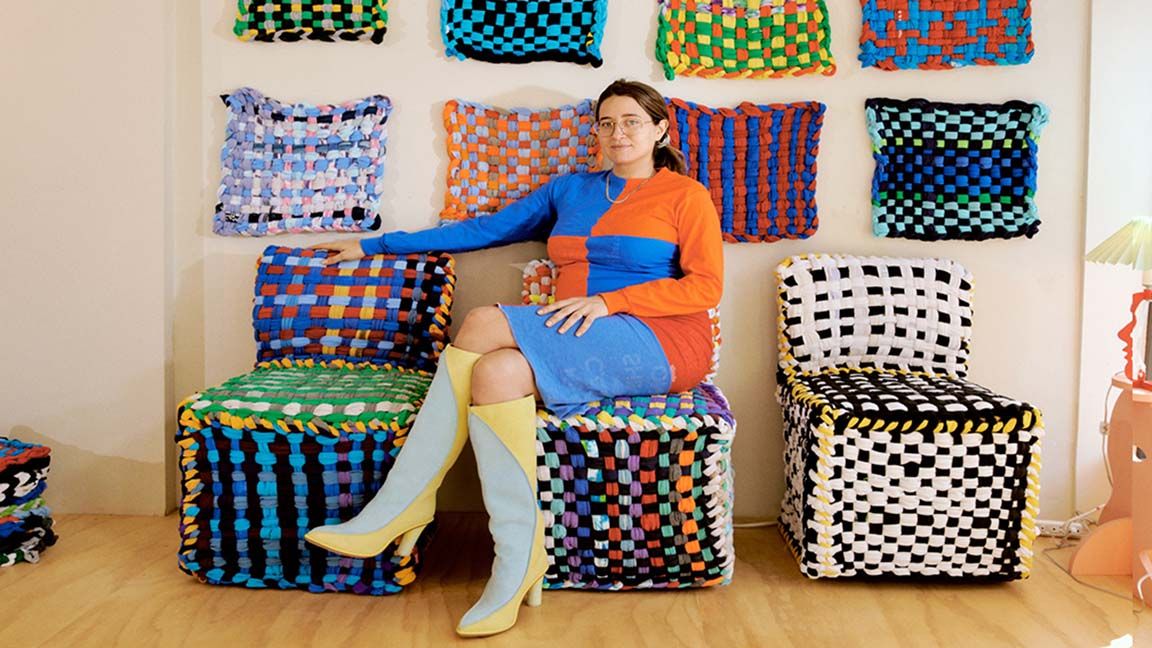Not far from the Pottery Barn bilao issue from last year, another Western brand is being called out for cultural appropriation.
Early this week, Vogue Runway featured a furniture designer for her “upcycled items from discarded fabrics” and Filipinos noticed how much it resembles a basahan.
Elise McMahon wants to start a movement to address the 25 million t-shirts being dumped in landfills, being burned, or thrown in the ocean every month.
With her friend and textile artist Francesca Capone, they created an 18-inch loom where anyone can weave strips of cloth from old shirts to make chairs, cushions, weighted blankets.
“With millions of novelty t-shirts being discarded each year, we have developed this loom to encourage DIY home recycling and the creation of heirloom objects that will be shared and saved long into the future, keeping this useful material out of landfills,” they wrote.
The loom comes with a manual and a video class and costs $200. Discarded t-shirts not included.
The final product, Filipino netizens pointed out, resembles the typical basahan or doormats that already recycle scrap cloths here in the Philippines.
Many called out the American artist saying “South Asia and Latin America has been doing this for decades but when a white person does it, it gets Vogue spotlight and a 200 dollar price tag?”
Basahans that resemble McMahon’s creations are sold along sidewalks and public markets for P10 to P20 each.
However, many vendors suffer from unfair wages from middlemen and earned only around P12 to P16 after making ten rugs a day.
Others brought up the brand Rags2Riches, which has partnered with communities in Payatas, Quezon City creating artisan bags, clothing, accessories, and pillowcases since 2007.
The brand’s advocacy has been shared in international media such as National Geographic, Washington Post, and The Guardian.
On her part, McMahon acknowledged the similarities to her work saying she only knew about the basahan “weaving style” through the comments but is open to educating herself.
“I really respect this practice and all people who are being resourceful [with] craft and waste globally,” she wrote. “I’m aware of my privileges and all the potential for resulting blind spots… I wish I had known about this before and am glad to know about it now.”
This is not the first time high-end fashion brands have been accused of cultural appropriation.
In 2021, Pottery Barn started selling “handcrafted bamboo wall art” priced at $299 that closely resembles a pancit bilao.
Back in 2017, Balenciaga launched in a runway “resort bags” that netizens jokingly called bayongciaga because of its design similar to a reusable bayong one would use in Divisoria.
Even Valenciano and Chanel had released dresses that closely look like the barong Tagalog and the terno, respectively despite the countless publications showing these to be national dresses in the Philippines.
All of the examples mentioned received backlash from Filipinos online while many realized that the Filipino culture remains invisible to the rest of the world.
Thankfully, unlike the earlier brands, McMahon has reached out to Reese Fernandez-Ruiz one of the co-owners of Rags2Riches regarding the matter.
According to Reese, they have been “kind, open, and considerate-and is doing the work of learning more and better”.
Other artisans and advocates using the same weaving technique have applauded both brands for communicating with each other and rose above the negative comments that started it all.
“The goal is not to compete but to unite and work hand in hand in reducing waste products,” one of the artists told local media citing that the real enemy remains to be the environmental problem brought by textile waste.
Tags: #rags2riches, #EliseMcMahon, #basahan, #weavingstyle
